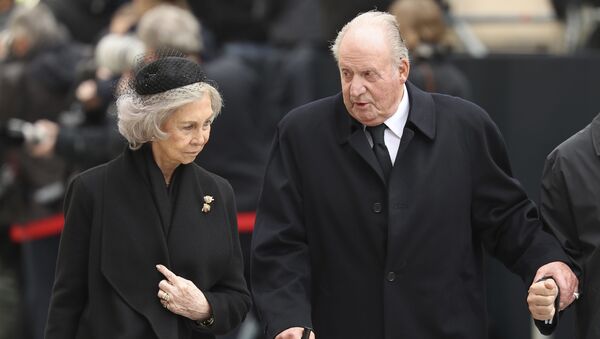Recent scandalous revelations about the royal house and the constant spreading of salacious information regarding Juan Carlos I have put the Spanish monarchy in an increasingly unenviable position.
Reports regarding Juan Carlos de Borbón allegedly charging fees for the construction of a high-speed railway in Saudi Arabia, added to his girlfriend Corinna Larsen’s shocking confessions, are just the tip of the iceberg.
The downward trajectory began in 2006 with a corruption scandal and continued in 2012 with an unpleasant incident during Juan Carlos’ elephant hunt in Botswana. And to make matters worse, all this happened amid a deep economic crisis.
In June 2014, Juan Carlos I decided to abdicate in favour of his son Felipe, who became the head of state. But that didn’t stop the crisis, nor did it do anything to boost the reputation of the institution.
And while the first wave of this 21st-century crisis occurred during the worst years of the global economic depression that started in 2008, its second wave is happening in the midst of a rather serious health crisis that has caused another economic crisis.
To make maters worse, the Spanish royal house could previously count on the silence of the Spanish media, now most of them have no hesitation in placing news about the Bourbon family on their front pages.
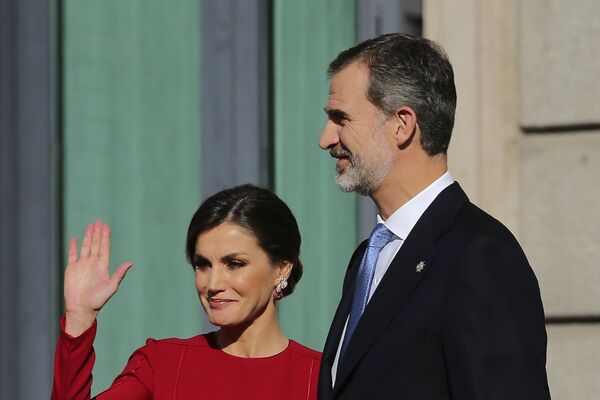
A Bourbon Crisis or a Crisis of the System
Currently, the Spanish Justice system is determining whether Juan Carlos I can be charged with tax evasion for having transferred illegal commissions to secret accounts.
The problem occurred because, according to the Spanish Constitution, the figure of the monarch is “inviolable and not subject to liability.” As a result, Spain’s head of state is untouchable even when acting outside the law.
But this is leading people to ask: What’s the use of the monarchy if it is tainted with corruption?
According to political scientist Jorge Verstrynge, the monarchy is “the key to the system.”
The former professor of Political Science at the Complutense University of Madrid says that that is the reason why there are no ‘dedicated’ monarchists in Spain. “It’s about convenience, not principles,” he explained. “The monarchy guarantees that bankers continue receiving wages, that the army doesn’t move, and that the existing relations between social forces are maintained.”
Political scientist Víctor Prieto speaks of “democratic sustainability” as the key to understanding the legitimacy of the system that is based on the “hereditary principle.” He explained that sustainability “depended on Juan Carlos I's personal charisma, built amid the successful story of transition to democracy.”
In his opinion, “Juan Carlos had to earn the throne, […] which he managed to achieve.” He also stressed that his fate “is linked to the maintenance of the bipartisan status quo.”
“This is a relationship of powers, inherited from the Franco system, where something has been improved and something has not,” Jorge Verstrynge said, pointing out that the judicial and police powers “haven’t been improved.” “And the judiciary has not yet been renewed,” he said.
The political scientist doesn’t believe that the current Bourbon crisis can be resolved by revising the Constitution, as other branches of government would be called into question.
“When the monarchical system is ridiculed, the same happens to all the rest powers. But such fears are also slightly exaggerated because when monarchy falls, the authorities will make sure that a replacement has already been found, not in the form of another King, but through a presidential or parliamentary regime. However, we have inherited one unpleasant thing from Francoism – fear.”
A Weakening of Support
For decades, Spanish media haven’t said much about the royal family, allowing the institution its privacy. The monarch remained untouched by the media. This kind of silence, which existed in Spain for more than three decades, has now ended, although the monarchy is still enjoying positive coverage from almost all the press and TV channels.
According to Verstrynge, the reason the media is no longer silent is “because the elephant in the room is so big that it can’t be hidden.”
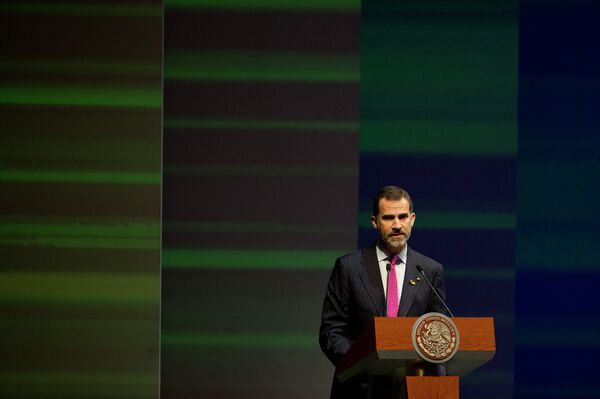
The Future of Monarchy
“There is a clear symmetry between the rigidity of constitutional reform and the role of the Crown as the centre of the political and legal system in Spain,” Victor Prieto said, adding that “this is due to the fact that voters associate the country’s political stability...with parliamentary monarchy.”
In his opinion, this has led to the fact that “for years the monarchy has remained out of political confrontation as a kind of arbiter of social conflicts.”
But Victor Prieto warns that the system needs a new boost to survive:
“I believe that, contrary to what it may have seemed for decades, the Spanish monarchy lacks the necessary political, historical and cultural legitimacy to believe that only the hereditary principle can guarantee its continuity in the future.”
Immunity from Prosecution
The Spanish legal system is now determining whether the actions which Juan Carlos I is accused of did take place after his abdication, when his immunity to the law had already ended. However, the issue divides lawyers, since it is unclear, and the king still enjoys special legal privileges.
But even if the King’s immunity protected his actions, his reputation is blemished.
“The king has the right to withdraw any money from banks, from his accounts. But when he was doing that, a severe crisis erupted in Spain,” Verstrynge explained, referring to the negotiations that started in 2014 to organize Juan Carlos’ abdication and grant him immunity.
“In fact, the king’s constitutional immunity has resulted in a kind of impunity that allowed the monarch to remain clear in the eyes of the law forever. He was allowed to do anything as long as business was going well,” Victor Prieto explained.
The True Value of the Monarchy
The Spanish monarchy represents the establishment, which is why broad sectors of politics, business and banking are reluctant to question its suitability for the country, even though it has been surrounded by serious scandals in recent years.
“In Spain, monarchy is not only a form of government, but, first of all, a way to distribute power,” Victor Prieto said. Therefore, in his opinion, changing the form of government may mean “expanding democracy in terms of popular sovereignty and real separation of powers.” “There are those who could say that a republic can be equally oligarchic and corrupt and that inequality is not alien to regimes where the head of state is elected by voting.”
“But I believe we need to think about a hypothetical referendum to keep the monarchy as a starting point, not the final destination, in order to facilitate the democratic process,” Prieto explained.
The Spanish establishment’s efforts to strengthen the monarchy may be linked to the fact that it is perceived as a protective screen against the possible disclosure of state secrets that would undermine the official version of Spain’s transition to democracy. However, Jorge Verstrynge, who was Secretary-General of the Alianza Popular in 1979-1986, believes that is not the case. “It will come out anyway,” he said. “We all knew King Juan Carlos had been involved in the attempted coup on 23 February 1981. Being a young man, recently elected Secretary-General, I knew perfectly well that a coup was being prepared.”
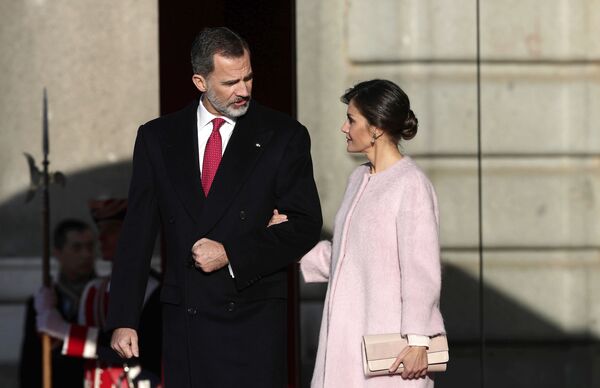
Seizing the Opportunity?
The Spanish monarchical system credibility crisis occurred amid two very serious contingencies: the economic depression that started in 2008 and the current socioeconomic deterioration following the coronavirus health emergency.
This context can be exploited by forces that might otherwise fail to effectively promote alternative visions of state organization. The political party Podemos, aa coalition partner in the Pedro Sánchez government, is a prime example of this.
“But it should be remembered that this information (about scandals) appears in the British media and that it is the Swiss Prosecutor’s Office that initiates the lawsuit,” Victor Prieto recalled, admitting that “the collapse of some of the key statements of the Transition period and the appearance of new political actors” has allowed a thorough questioning of the Spanish monarchical system.
In his opinion, the so-called Royal Cases “have been popular in political and journalistic circles for years. The only difference is that Juan Carlos’ mistakes now coincide with economic crises that have made citizens more demanding,” he explained.
“The succession to Felipe VI requires an update of the monarchy’s legitimacy, which is impossible today,” he added.
A System Touched by Death?
In 2014, Felipe VI got a country full of problems and inherited what Victor Prieto calls his father’s “legitimacy by results” when he succeeded in “assimilating the 1978 democracy thus cementing his position as king.”
“This can prove to be an insurmountable obstacle for Felipe VI, as it violates the dynastic principle,” he explained. “Faced with the inability to appeal to the latter, Felipe VI is politically disoriented, looking for something that will further strengthen his power, as, for example, when he failed to present himself as the sovereign guarantor of Spain’s unity after the Catalonia independence referendum of 1 October 2017.”
“The problem with the monarchy is that the blow to its prestige is so great that it cannot be restored,” Jorge Verstrynge said. “This is similar to the sociological theory of functionalism: nothing needs to be changed because every institution has its own function. The monarchy’s function was to make the transition to a democratic system possible without any uprising of an army that had been loyal to the leader. But now there is no longer a leader. So what is the use of the monarchy? What would it protect us from? The coronavirus?” he wondered
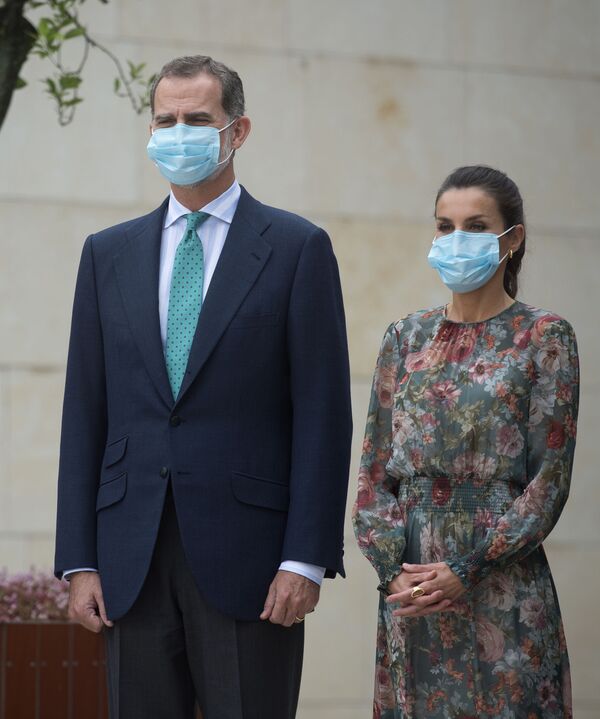
The Solidity of the Institution
That said, the recent scandals around the royal family are not greatly affecting the solidity of this political structure, which seems to enjoy broad support that guarantees its continuity. Jorge Verstrynge shares a funny story:
“When Ronald Reagan came to Madrid [in 1985], I was supposed to attend a cocktail party that was held in his honour. Reagan came up to me and said, ‘Are you Secretary-General of the Right Party? I want to talk to you. The Soviet Union is an empire of evil, and we should fight against it with all our might. Because it wants to last a thousand years, and it will last a thousand years.’ Well, now you see how many years the Soviet Union lasted.”
“There are things that seem immutable, that seem impossible to get, but one day, boom, they fall,” Verstrynge said.
For him, the problem with Spanish monarchy is that it is its political structure “makes it possible to do what Juan Carlos I did.” Thus, Felipe VI cannot be unaware of certain behaviours that stem from the very nature of the system that makes him the head of state. “We are going to make his son, clean as snow, as they say in France, head of state” he said, referring to Juan Carlos’ abdication in 2014. “How can be clean as snow, if he agreed to immunity?” In other words, Felipe VI was perfectly aware of what was going on.
“The monarchy, as a political structure, has died in the hearts of Spaniards. As for Juan Carlos, he is invulnerable, and it was the monarchy system that has allowed it,” he concluded.
